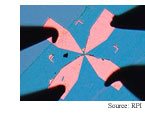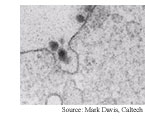
 |
 |
 |
 |


October-December 2010
Papers of Note
 Add
the right amount of water to graphene and you have a material tuned to make
superfast computer circuits.
Add
the right amount of water to graphene and you have a material tuned to make
superfast computer circuits.Tunable Bandgap in Graphene by the Controlled Adsorption of Water Molecules, Small
Immerse tiny particles in liquid crystal and zap them with an electric field, and you have a powerful technology for making displays, micromachines and biochips.
Nonlinear electrophoresis of dielectric and metal spheres in a nematic liquid crystal, Nature
Stories Elsewhere
Brain-computer interface used to quickly call up images, Ars Technica
(Source: Nature paper On-line, voluntary control of human temporal lobe neurons)
Robots could ditch fingers for beanbags, New Scientist
(Source: Proceedings of the National Academy of Sciences paper Universal robotic gripper based on the jamming of granular material)
A one-way system for sound, Nature News
(Source: Nature Materials paper An acoustic rectifier)
Playing games with enzymes, Chemistry World
(Source: Nature Nanotechnology paper Training a molecular automaton to play a game)
Chemical origami used to create a DNA Möbius strip, Ars Technica
(Source: Nature Nanotechnology paper Folding and cutting DNA into reconfigurable topological nanostructures)
Flexible and Stretchable LEDs, Electronic News
(Source: Nature Materials paper Waterproof AlInGaP optoelectronics on stretchable substrates with applications in biomedicine and robotics)
Bendable Memory Made from Nanowire Transistors, Technology Review
(Source: Nano Letters paper Novel Nonvolatile Memory with Multibit Storage Based on a ZnO Nanowire Transistor)
Features
 Nano
cancer drugs move to the next level: humans
Nano
cancer drugs move to the next level: humansA growing number of cancer therapies packaged in infinitesimal particles are making their way to patients.
Can nanotech beat cancer?
Cancer will always be with us in some form, but the fear and devastation it causes could be history within a generation. We'll have the tiniest of things to thank for it.
View from the High Ground
Email conversations with researchers in high places.
How It Works
Get the nitty-gritty on nanotechnology, biochips, self-assembly, DNA technologies, quantum cryptography, and more.
Buy an ad link |

Blog RSS feed
See our sister publication
Energy Research News
|
| "Physics
is to the rest of science what machine tools are to engineering. A
corollary is that science places power in our hands which can be used
for good or ill. Technology has been abused in this way throughout
the ages from gunpowder to atomic bombs." - John Pendry, Imperial College London |
Thanks to Kevin from
GoldBamboo.com
for technical support